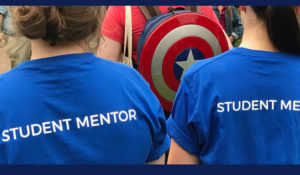At many institutions, these weeks mark the beginning of university for a new cohort of first year students. Orientation Week (or O Week) is when we invite our commencing students onto campus, generally bombard them with lots of information, perhaps even feed them and generally squeeze as much exposure to the institution as is possible in a day! I have been involved in many orientations in my career but this was a special one for me, as my daughter was also embarking on this educational journey.
Being on the ‘other side’ (as I have come to describe it) has been an interesting experience. While I have worked in HE for over 20 years and spent the last decade conducting deeply qualitative research on students and student experience, helping my daughter in this venture (when asked) has made me realise how little I actually know. Let’s take online enrolment as an example.
During interviews I have conducted with students at all stages of their university career, online enrolment, particularly for tutorials has been a common theme – particularly the stress of getting timeslots that can cater to work and family responsibilities. Students have told me the great lengths they go to in order to ensure that they get their choices – strategies often learnt after their first or second encounter with the online tutorial system. Of course I passed these tips onto my daughter (unlike the many first-in-family students I have encountered she had ready access to a ‘knowledgeable other’). I likened the experience to buying concert tickets online, I told her to refresh her screen repeatedly, to have two options available for all her tutes etc etc. The registration time (7.07pm to be precise) for the first tute duly arrived and there we were poised on the couch, my daughter’s finger hovering over the refresh button and at the allocated time she refreshed, only to have both her options come up as full. She screamed (I did too) and frantically jabbed at another not sure if this would fit with her lectures. She was lucky – it did and disaster was averted!
I tell this story because it got me reflecting on a number of things. Firstly, how many students are completely unprepared for that experience? What are the implications for them if they are unable to choose appropriate timing? Also, if someone is already encountering obstacles to attending university, how many just give up at that point – a statistic that remains unrecorded?
 During my own Faculty O-Day, I took the opportunity to speak about this to some of the student mentors who had just started in the Students as Partners in Mentoring (SaPiM) initiative. This program has been co-designed by students and staff, so is richly informed by student perspectives, with mentors chosen based on their diversity of life experience.
During my own Faculty O-Day, I took the opportunity to speak about this to some of the student mentors who had just started in the Students as Partners in Mentoring (SaPiM) initiative. This program has been co-designed by students and staff, so is richly informed by student perspectives, with mentors chosen based on their diversity of life experience.
The mentors told me how online tutorial enrolment often  meant relocating to friends’ houses to get better internet speeds (local libraries not being open in the evening), preparing multiple options (in ranked order) to manage their schedule and all reflected upon the stress of the undertaking. Talking to student mentors was insightful and also reassuring, reminding me that our students are the richest resource we have as educators. Engaging with them in productive and meaningful ways provides insights and perspectives on university, that we (as staff) do not always have access to.
meant relocating to friends’ houses to get better internet speeds (local libraries not being open in the evening), preparing multiple options (in ranked order) to manage their schedule and all reflected upon the stress of the undertaking. Talking to student mentors was insightful and also reassuring, reminding me that our students are the richest resource we have as educators. Engaging with them in productive and meaningful ways provides insights and perspectives on university, that we (as staff) do not always have access to.
The rich work relating to ‘students as partners’ underscores this, one only has to read the work of Sally Varnham, Kelly Matthews or Wendy Green (amongst others) to gain insights into how our students can deeply inform practice and policy in universities.
Personally, running the online tutorial gauntlet (as a bystander) has made me consider how we can better inform new learners (particularly those who are the first in their families) about this process:
- pre-orientation student run help sessions facilitate?
- YouTube videos made by students?
- Or… (suggestions welcomed)
Until next time,
